An Analysis of Positive and Normative Accounting Theories
VerifiedAdded on 2020/02/03
|8
|2094
|303
Report
AI Summary
This report provides a comprehensive comparison of positive and normative accounting theories. It begins by defining positive accounting, which focuses on fact-based, objective analysis of economic data to improve company performance, and normative accounting, which is subjective and deals with morality in accounting, often addressing future events. The report then outlines the advantages and disadvantages of each theory, including the ability of positive accounting to achieve current business goals and the future-oriented focus of normative accounting. Key differences are highlighted, such as positive theory's basis in past events and current financial standing versus normative theory's focus on future events and financial standing. The report also explores the practical implications of each theory, emphasizing how managers can use them to improve financial planning, set objectives, and make informed decisions. Finally, the report concludes by underscoring the importance of understanding the distinctions between these theories for maximizing results in financial management.
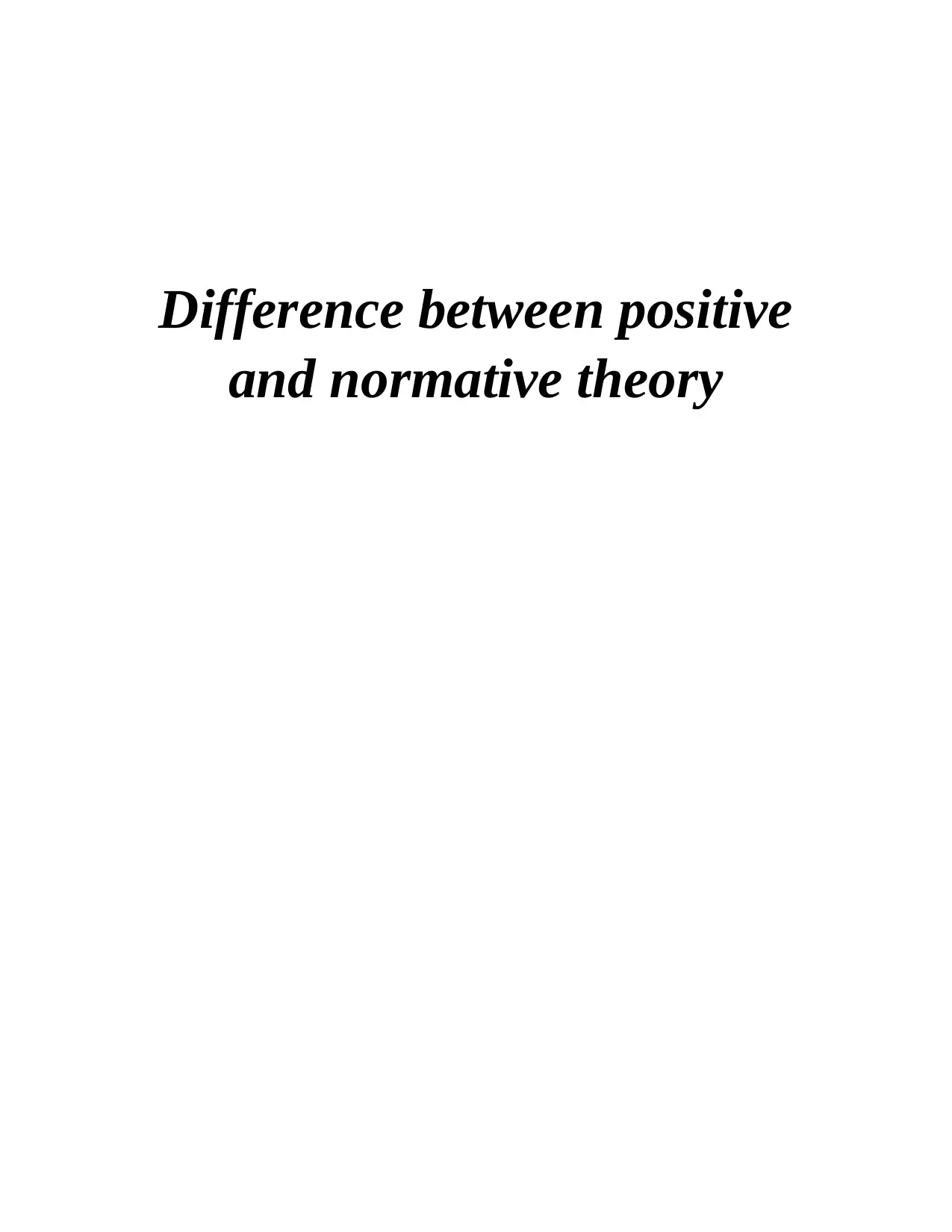
Difference between positive
and normative theory
and normative theory
Paraphrase This Document
Need a fresh take? Get an instant paraphrase of this document with our AI Paraphraser
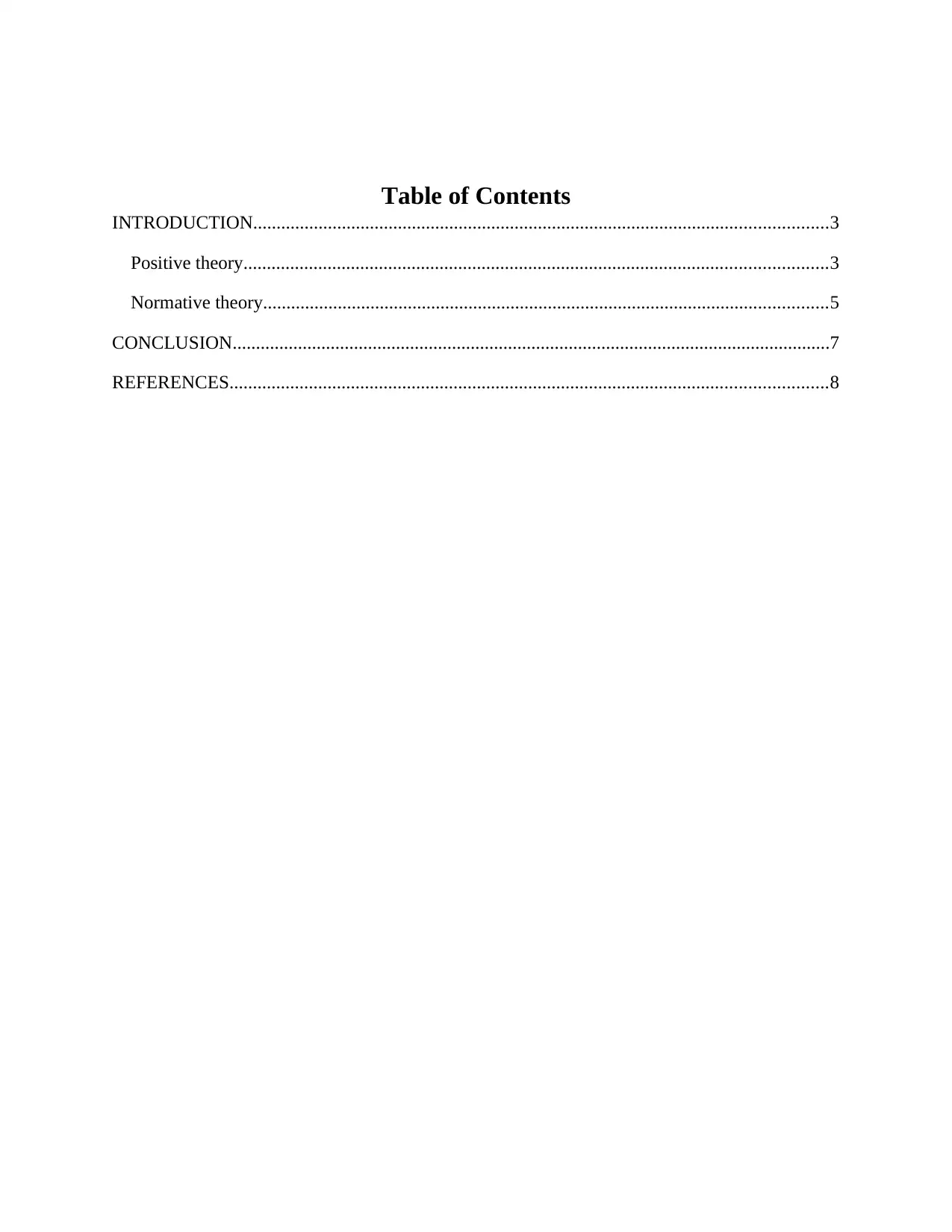
Table of Contents
INTRODUCTION...........................................................................................................................3
Positive theory.............................................................................................................................3
Normative theory.........................................................................................................................5
CONCLUSION................................................................................................................................7
REFERENCES................................................................................................................................8
INTRODUCTION...........................................................................................................................3
Positive theory.............................................................................................................................3
Normative theory.........................................................................................................................5
CONCLUSION................................................................................................................................7
REFERENCES................................................................................................................................8
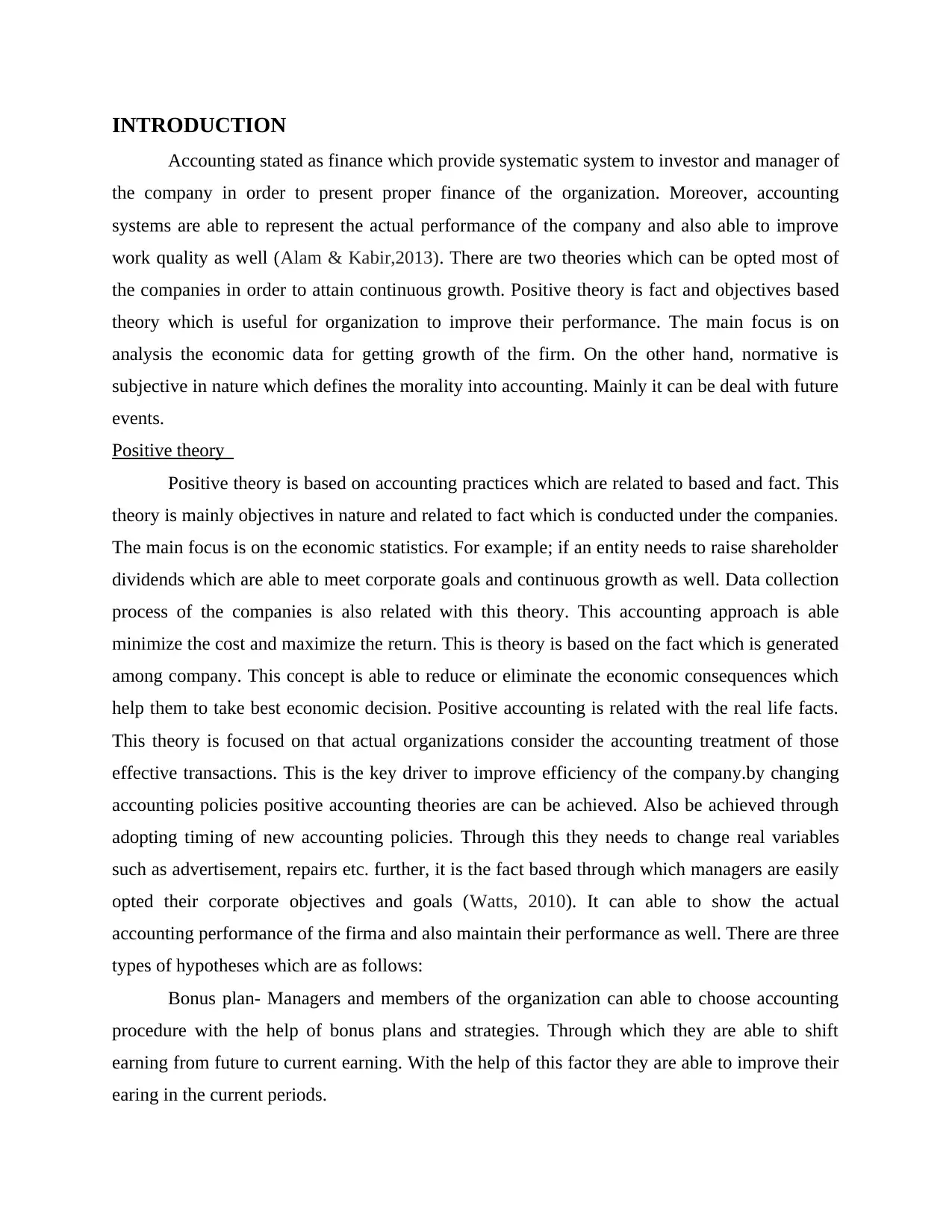
INTRODUCTION
Accounting stated as finance which provide systematic system to investor and manager of
the company in order to present proper finance of the organization. Moreover, accounting
systems are able to represent the actual performance of the company and also able to improve
work quality as well (Alam & Kabir,2013). There are two theories which can be opted most of
the companies in order to attain continuous growth. Positive theory is fact and objectives based
theory which is useful for organization to improve their performance. The main focus is on
analysis the economic data for getting growth of the firm. On the other hand, normative is
subjective in nature which defines the morality into accounting. Mainly it can be deal with future
events.
Positive theory
Positive theory is based on accounting practices which are related to based and fact. This
theory is mainly objectives in nature and related to fact which is conducted under the companies.
The main focus is on the economic statistics. For example; if an entity needs to raise shareholder
dividends which are able to meet corporate goals and continuous growth as well. Data collection
process of the companies is also related with this theory. This accounting approach is able
minimize the cost and maximize the return. This is theory is based on the fact which is generated
among company. This concept is able to reduce or eliminate the economic consequences which
help them to take best economic decision. Positive accounting is related with the real life facts.
This theory is focused on that actual organizations consider the accounting treatment of those
effective transactions. This is the key driver to improve efficiency of the company.by changing
accounting policies positive accounting theories are can be achieved. Also be achieved through
adopting timing of new accounting policies. Through this they needs to change real variables
such as advertisement, repairs etc. further, it is the fact based through which managers are easily
opted their corporate objectives and goals (Watts, 2010). It can able to show the actual
accounting performance of the firma and also maintain their performance as well. There are three
types of hypotheses which are as follows:
Bonus plan- Managers and members of the organization can able to choose accounting
procedure with the help of bonus plans and strategies. Through which they are able to shift
earning from future to current earning. With the help of this factor they are able to improve their
earing in the current periods.
Accounting stated as finance which provide systematic system to investor and manager of
the company in order to present proper finance of the organization. Moreover, accounting
systems are able to represent the actual performance of the company and also able to improve
work quality as well (Alam & Kabir,2013). There are two theories which can be opted most of
the companies in order to attain continuous growth. Positive theory is fact and objectives based
theory which is useful for organization to improve their performance. The main focus is on
analysis the economic data for getting growth of the firm. On the other hand, normative is
subjective in nature which defines the morality into accounting. Mainly it can be deal with future
events.
Positive theory
Positive theory is based on accounting practices which are related to based and fact. This
theory is mainly objectives in nature and related to fact which is conducted under the companies.
The main focus is on the economic statistics. For example; if an entity needs to raise shareholder
dividends which are able to meet corporate goals and continuous growth as well. Data collection
process of the companies is also related with this theory. This accounting approach is able
minimize the cost and maximize the return. This is theory is based on the fact which is generated
among company. This concept is able to reduce or eliminate the economic consequences which
help them to take best economic decision. Positive accounting is related with the real life facts.
This theory is focused on that actual organizations consider the accounting treatment of those
effective transactions. This is the key driver to improve efficiency of the company.by changing
accounting policies positive accounting theories are can be achieved. Also be achieved through
adopting timing of new accounting policies. Through this they needs to change real variables
such as advertisement, repairs etc. further, it is the fact based through which managers are easily
opted their corporate objectives and goals (Watts, 2010). It can able to show the actual
accounting performance of the firma and also maintain their performance as well. There are three
types of hypotheses which are as follows:
Bonus plan- Managers and members of the organization can able to choose accounting
procedure with the help of bonus plans and strategies. Through which they are able to shift
earning from future to current earning. With the help of this factor they are able to improve their
earing in the current periods.
⊘ This is a preview!⊘
Do you want full access?
Subscribe today to unlock all pages.

Trusted by 1+ million students worldwide
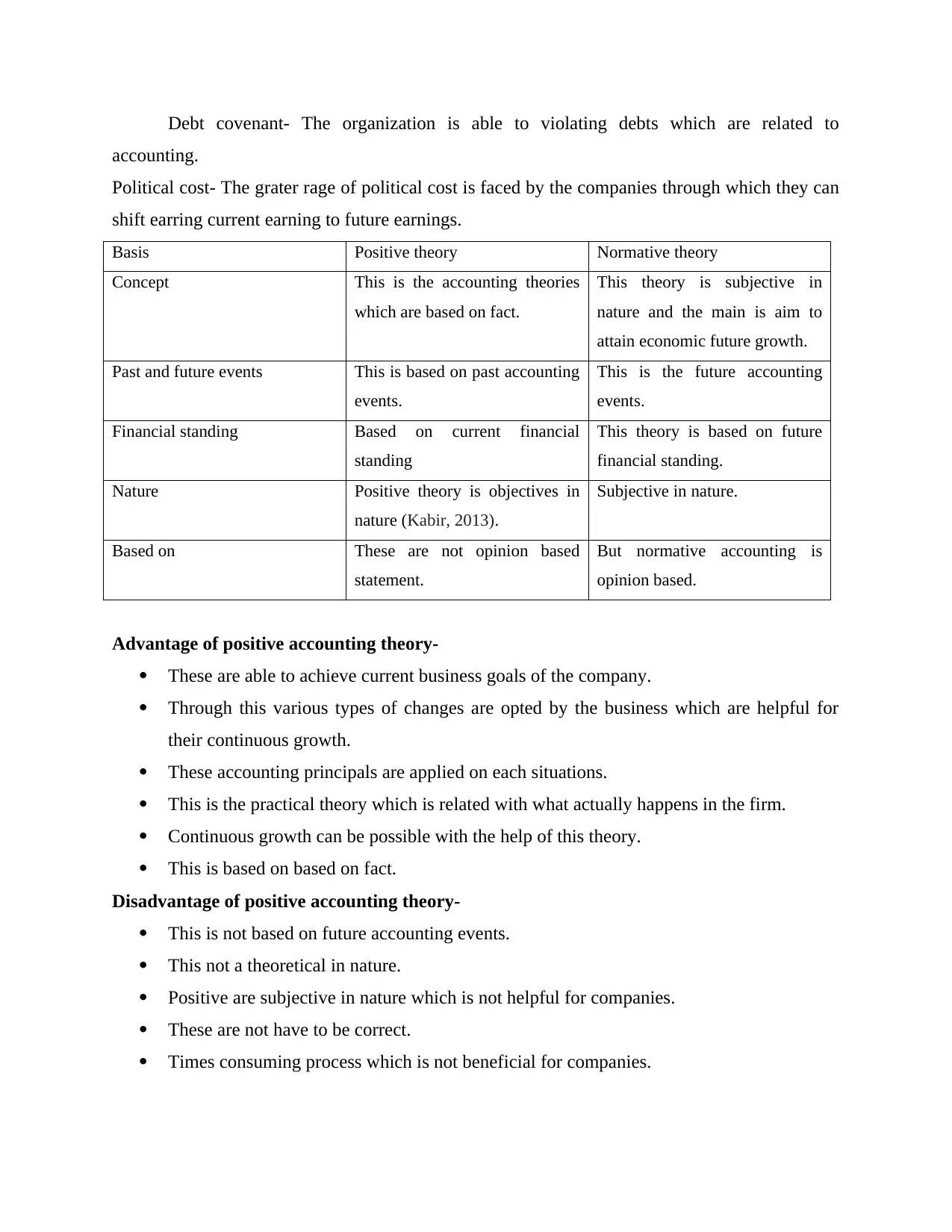
Debt covenant- The organization is able to violating debts which are related to
accounting.
Political cost- The grater rage of political cost is faced by the companies through which they can
shift earring current earning to future earnings.
Basis Positive theory Normative theory
Concept This is the accounting theories
which are based on fact.
This theory is subjective in
nature and the main is aim to
attain economic future growth.
Past and future events This is based on past accounting
events.
This is the future accounting
events.
Financial standing Based on current financial
standing
This theory is based on future
financial standing.
Nature Positive theory is objectives in
nature (Kabir, 2013).
Subjective in nature.
Based on These are not opinion based
statement.
But normative accounting is
opinion based.
Advantage of positive accounting theory-
These are able to achieve current business goals of the company.
Through this various types of changes are opted by the business which are helpful for
their continuous growth.
These accounting principals are applied on each situations.
This is the practical theory which is related with what actually happens in the firm.
Continuous growth can be possible with the help of this theory.
This is based on based on fact.
Disadvantage of positive accounting theory-
This is not based on future accounting events.
This not a theoretical in nature.
Positive are subjective in nature which is not helpful for companies.
These are not have to be correct.
Times consuming process which is not beneficial for companies.
accounting.
Political cost- The grater rage of political cost is faced by the companies through which they can
shift earring current earning to future earnings.
Basis Positive theory Normative theory
Concept This is the accounting theories
which are based on fact.
This theory is subjective in
nature and the main is aim to
attain economic future growth.
Past and future events This is based on past accounting
events.
This is the future accounting
events.
Financial standing Based on current financial
standing
This theory is based on future
financial standing.
Nature Positive theory is objectives in
nature (Kabir, 2013).
Subjective in nature.
Based on These are not opinion based
statement.
But normative accounting is
opinion based.
Advantage of positive accounting theory-
These are able to achieve current business goals of the company.
Through this various types of changes are opted by the business which are helpful for
their continuous growth.
These accounting principals are applied on each situations.
This is the practical theory which is related with what actually happens in the firm.
Continuous growth can be possible with the help of this theory.
This is based on based on fact.
Disadvantage of positive accounting theory-
This is not based on future accounting events.
This not a theoretical in nature.
Positive are subjective in nature which is not helpful for companies.
These are not have to be correct.
Times consuming process which is not beneficial for companies.
Paraphrase This Document
Need a fresh take? Get an instant paraphrase of this document with our AI Paraphraser
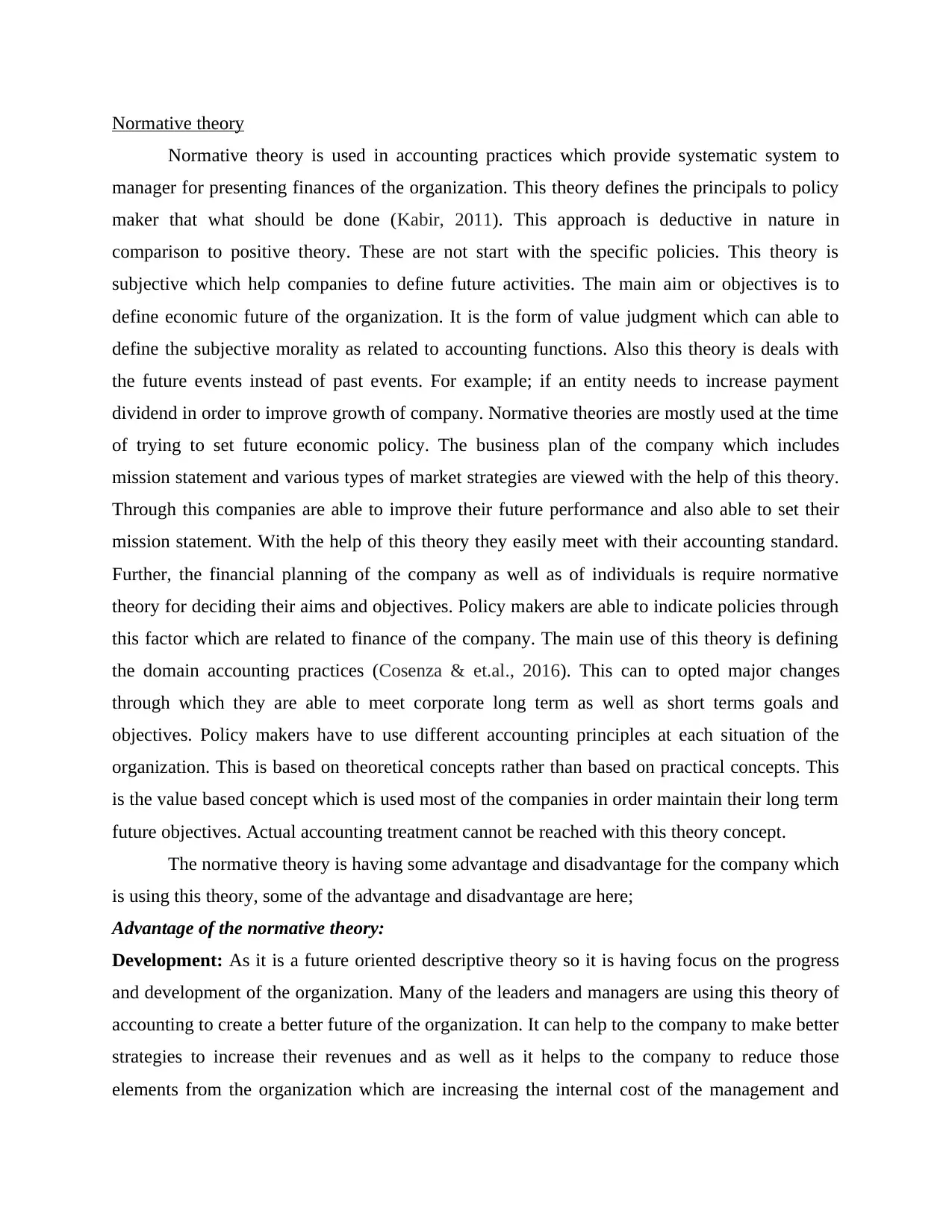
Normative theory
Normative theory is used in accounting practices which provide systematic system to
manager for presenting finances of the organization. This theory defines the principals to policy
maker that what should be done (Kabir, 2011). This approach is deductive in nature in
comparison to positive theory. These are not start with the specific policies. This theory is
subjective which help companies to define future activities. The main aim or objectives is to
define economic future of the organization. It is the form of value judgment which can able to
define the subjective morality as related to accounting functions. Also this theory is deals with
the future events instead of past events. For example; if an entity needs to increase payment
dividend in order to improve growth of company. Normative theories are mostly used at the time
of trying to set future economic policy. The business plan of the company which includes
mission statement and various types of market strategies are viewed with the help of this theory.
Through this companies are able to improve their future performance and also able to set their
mission statement. With the help of this theory they easily meet with their accounting standard.
Further, the financial planning of the company as well as of individuals is require normative
theory for deciding their aims and objectives. Policy makers are able to indicate policies through
this factor which are related to finance of the company. The main use of this theory is defining
the domain accounting practices (Cosenza & et.al., 2016). This can to opted major changes
through which they are able to meet corporate long term as well as short terms goals and
objectives. Policy makers have to use different accounting principles at each situation of the
organization. This is based on theoretical concepts rather than based on practical concepts. This
is the value based concept which is used most of the companies in order maintain their long term
future objectives. Actual accounting treatment cannot be reached with this theory concept.
The normative theory is having some advantage and disadvantage for the company which
is using this theory, some of the advantage and disadvantage are here;
Advantage of the normative theory:
Development: As it is a future oriented descriptive theory so it is having focus on the progress
and development of the organization. Many of the leaders and managers are using this theory of
accounting to create a better future of the organization. It can help to the company to make better
strategies to increase their revenues and as well as it helps to the company to reduce those
elements from the organization which are increasing the internal cost of the management and
Normative theory is used in accounting practices which provide systematic system to
manager for presenting finances of the organization. This theory defines the principals to policy
maker that what should be done (Kabir, 2011). This approach is deductive in nature in
comparison to positive theory. These are not start with the specific policies. This theory is
subjective which help companies to define future activities. The main aim or objectives is to
define economic future of the organization. It is the form of value judgment which can able to
define the subjective morality as related to accounting functions. Also this theory is deals with
the future events instead of past events. For example; if an entity needs to increase payment
dividend in order to improve growth of company. Normative theories are mostly used at the time
of trying to set future economic policy. The business plan of the company which includes
mission statement and various types of market strategies are viewed with the help of this theory.
Through this companies are able to improve their future performance and also able to set their
mission statement. With the help of this theory they easily meet with their accounting standard.
Further, the financial planning of the company as well as of individuals is require normative
theory for deciding their aims and objectives. Policy makers are able to indicate policies through
this factor which are related to finance of the company. The main use of this theory is defining
the domain accounting practices (Cosenza & et.al., 2016). This can to opted major changes
through which they are able to meet corporate long term as well as short terms goals and
objectives. Policy makers have to use different accounting principles at each situation of the
organization. This is based on theoretical concepts rather than based on practical concepts. This
is the value based concept which is used most of the companies in order maintain their long term
future objectives. Actual accounting treatment cannot be reached with this theory concept.
The normative theory is having some advantage and disadvantage for the company which
is using this theory, some of the advantage and disadvantage are here;
Advantage of the normative theory:
Development: As it is a future oriented descriptive theory so it is having focus on the progress
and development of the organization. Many of the leaders and managers are using this theory of
accounting to create a better future of the organization. It can help to the company to make better
strategies to increase their revenues and as well as it helps to the company to reduce those
elements from the organization which are increasing the internal cost of the management and
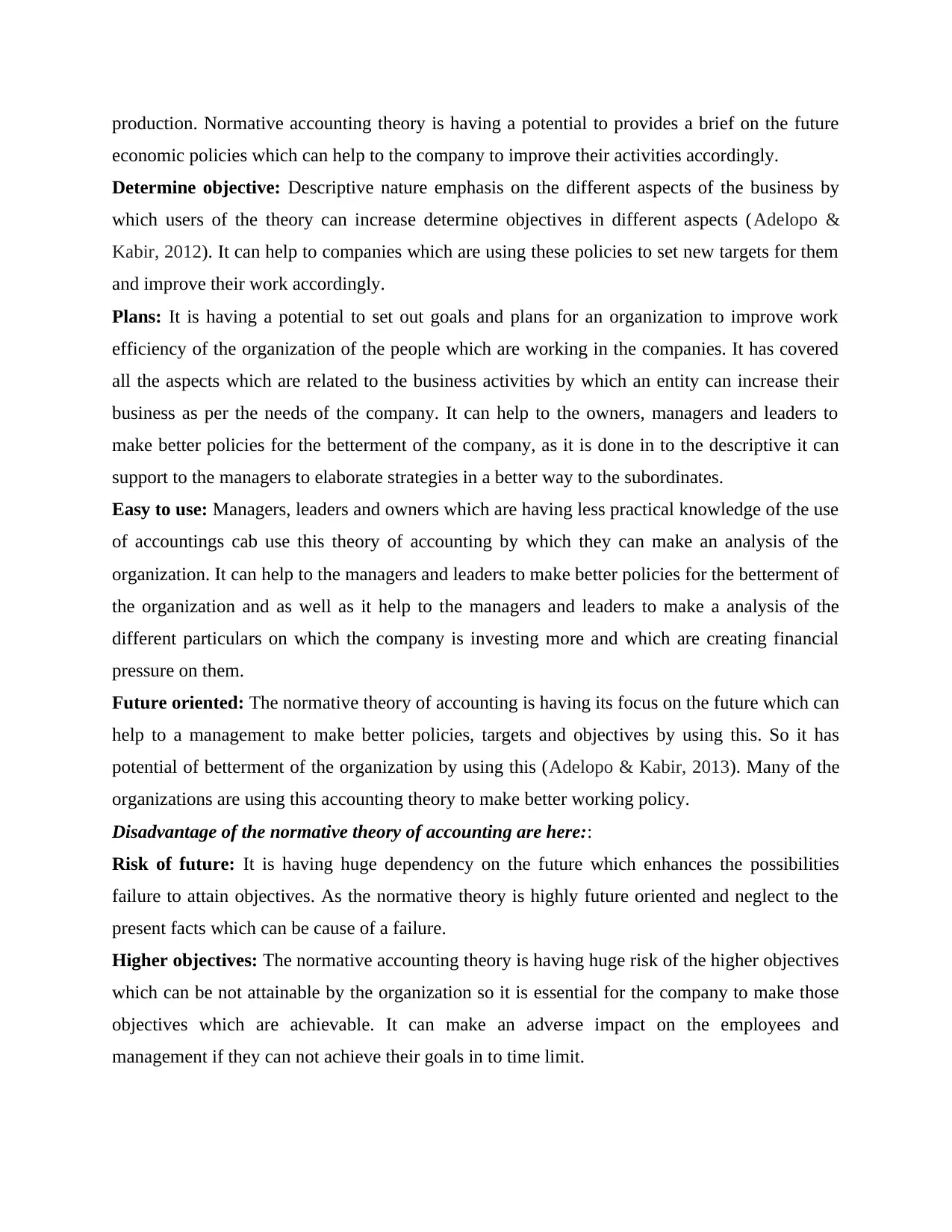
production. Normative accounting theory is having a potential to provides a brief on the future
economic policies which can help to the company to improve their activities accordingly.
Determine objective: Descriptive nature emphasis on the different aspects of the business by
which users of the theory can increase determine objectives in different aspects (Adelopo &
Kabir, 2012). It can help to companies which are using these policies to set new targets for them
and improve their work accordingly.
Plans: It is having a potential to set out goals and plans for an organization to improve work
efficiency of the organization of the people which are working in the companies. It has covered
all the aspects which are related to the business activities by which an entity can increase their
business as per the needs of the company. It can help to the owners, managers and leaders to
make better policies for the betterment of the company, as it is done in to the descriptive it can
support to the managers to elaborate strategies in a better way to the subordinates.
Easy to use: Managers, leaders and owners which are having less practical knowledge of the use
of accountings cab use this theory of accounting by which they can make an analysis of the
organization. It can help to the managers and leaders to make better policies for the betterment of
the organization and as well as it help to the managers and leaders to make a analysis of the
different particulars on which the company is investing more and which are creating financial
pressure on them.
Future oriented: The normative theory of accounting is having its focus on the future which can
help to a management to make better policies, targets and objectives by using this. So it has
potential of betterment of the organization by using this (Adelopo & Kabir, 2013). Many of the
organizations are using this accounting theory to make better working policy.
Disadvantage of the normative theory of accounting are here::
Risk of future: It is having huge dependency on the future which enhances the possibilities
failure to attain objectives. As the normative theory is highly future oriented and neglect to the
present facts which can be cause of a failure.
Higher objectives: The normative accounting theory is having huge risk of the higher objectives
which can be not attainable by the organization so it is essential for the company to make those
objectives which are achievable. It can make an adverse impact on the employees and
management if they can not achieve their goals in to time limit.
economic policies which can help to the company to improve their activities accordingly.
Determine objective: Descriptive nature emphasis on the different aspects of the business by
which users of the theory can increase determine objectives in different aspects (Adelopo &
Kabir, 2012). It can help to companies which are using these policies to set new targets for them
and improve their work accordingly.
Plans: It is having a potential to set out goals and plans for an organization to improve work
efficiency of the organization of the people which are working in the companies. It has covered
all the aspects which are related to the business activities by which an entity can increase their
business as per the needs of the company. It can help to the owners, managers and leaders to
make better policies for the betterment of the company, as it is done in to the descriptive it can
support to the managers to elaborate strategies in a better way to the subordinates.
Easy to use: Managers, leaders and owners which are having less practical knowledge of the use
of accountings cab use this theory of accounting by which they can make an analysis of the
organization. It can help to the managers and leaders to make better policies for the betterment of
the organization and as well as it help to the managers and leaders to make a analysis of the
different particulars on which the company is investing more and which are creating financial
pressure on them.
Future oriented: The normative theory of accounting is having its focus on the future which can
help to a management to make better policies, targets and objectives by using this. So it has
potential of betterment of the organization by using this (Adelopo & Kabir, 2013). Many of the
organizations are using this accounting theory to make better working policy.
Disadvantage of the normative theory of accounting are here::
Risk of future: It is having huge dependency on the future which enhances the possibilities
failure to attain objectives. As the normative theory is highly future oriented and neglect to the
present facts which can be cause of a failure.
Higher objectives: The normative accounting theory is having huge risk of the higher objectives
which can be not attainable by the organization so it is essential for the company to make those
objectives which are achievable. It can make an adverse impact on the employees and
management if they can not achieve their goals in to time limit.
⊘ This is a preview!⊘
Do you want full access?
Subscribe today to unlock all pages.

Trusted by 1+ million students worldwide
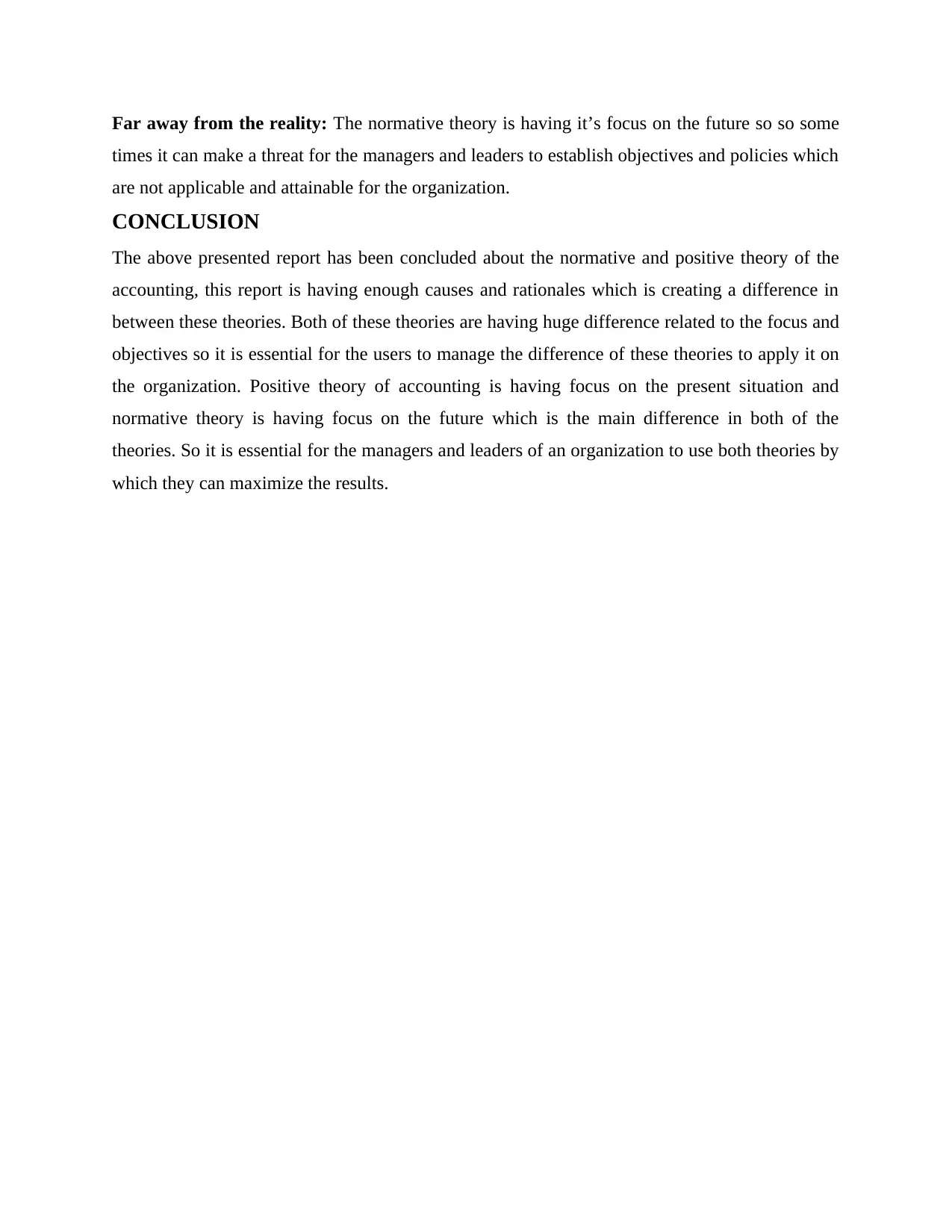
Far away from the reality: The normative theory is having it’s focus on the future so so some
times it can make a threat for the managers and leaders to establish objectives and policies which
are not applicable and attainable for the organization.
CONCLUSION
The above presented report has been concluded about the normative and positive theory of the
accounting, this report is having enough causes and rationales which is creating a difference in
between these theories. Both of these theories are having huge difference related to the focus and
objectives so it is essential for the users to manage the difference of these theories to apply it on
the organization. Positive theory of accounting is having focus on the present situation and
normative theory is having focus on the future which is the main difference in both of the
theories. So it is essential for the managers and leaders of an organization to use both theories by
which they can maximize the results.
times it can make a threat for the managers and leaders to establish objectives and policies which
are not applicable and attainable for the organization.
CONCLUSION
The above presented report has been concluded about the normative and positive theory of the
accounting, this report is having enough causes and rationales which is creating a difference in
between these theories. Both of these theories are having huge difference related to the focus and
objectives so it is essential for the users to manage the difference of these theories to apply it on
the organization. Positive theory of accounting is having focus on the present situation and
normative theory is having focus on the future which is the main difference in both of the
theories. So it is essential for the managers and leaders of an organization to use both theories by
which they can maximize the results.
Paraphrase This Document
Need a fresh take? Get an instant paraphrase of this document with our AI Paraphraser
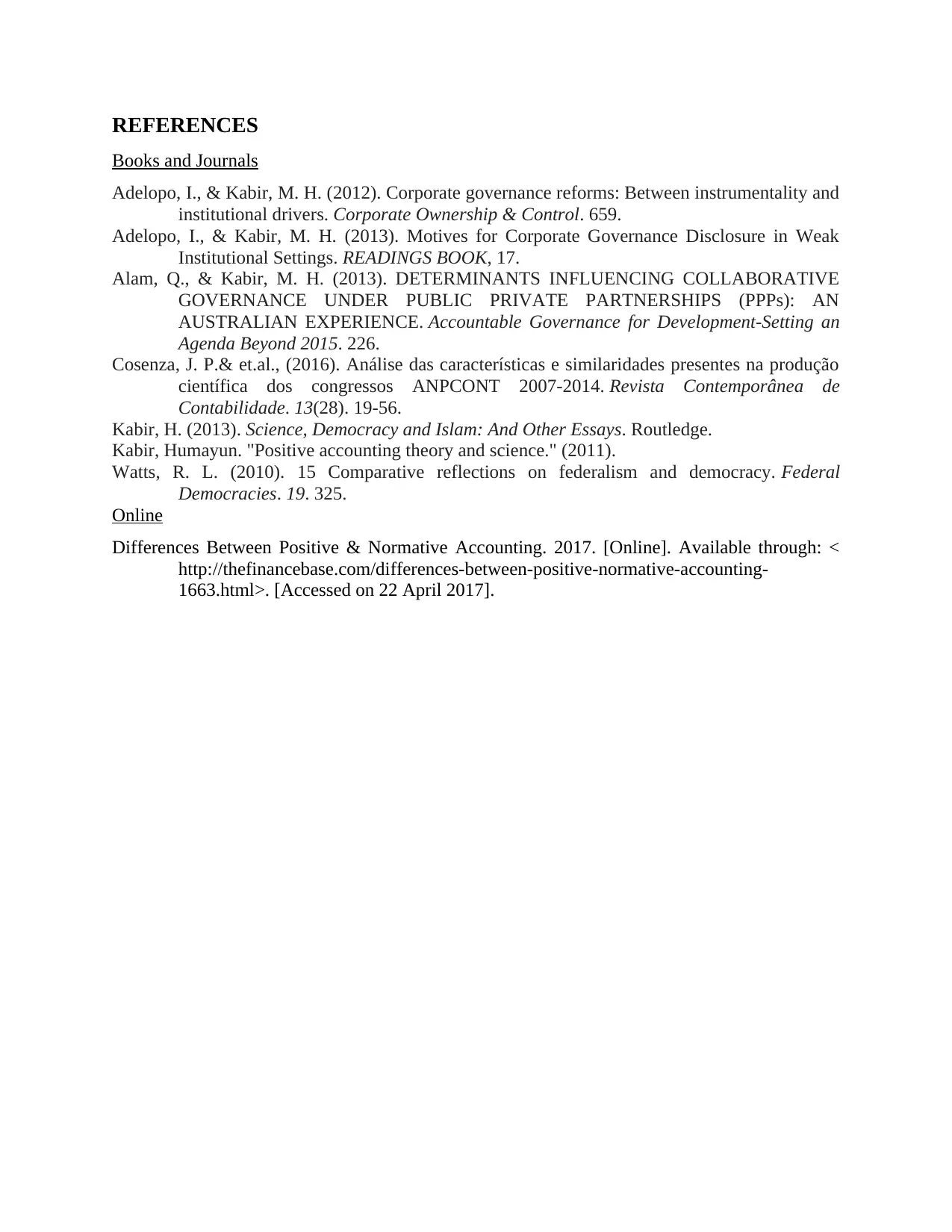
REFERENCES
Books and Journals
Adelopo, I., & Kabir, M. H. (2012). Corporate governance reforms: Between instrumentality and
institutional drivers. Corporate Ownership & Control. 659.
Adelopo, I., & Kabir, M. H. (2013). Motives for Corporate Governance Disclosure in Weak
Institutional Settings. READINGS BOOK, 17.
Alam, Q., & Kabir, M. H. (2013). DETERMINANTS INFLUENCING COLLABORATIVE
GOVERNANCE UNDER PUBLIC PRIVATE PARTNERSHIPS (PPPs): AN
AUSTRALIAN EXPERIENCE. Accountable Governance for Development-Setting an
Agenda Beyond 2015. 226.
Cosenza, J. P.& et.al., (2016). Análise das características e similaridades presentes na produção
científica dos congressos ANPCONT 2007-2014. Revista Contemporânea de
Contabilidade. 13(28). 19-56.
Kabir, H. (2013). Science, Democracy and Islam: And Other Essays. Routledge.
Kabir, Humayun. "Positive accounting theory and science." (2011).
Watts, R. L. (2010). 15 Comparative reflections on federalism and democracy. Federal
Democracies. 19. 325.
Online
Differences Between Positive & Normative Accounting. 2017. [Online]. Available through: <
http://thefinancebase.com/differences-between-positive-normative-accounting-
1663.html>. [Accessed on 22 April 2017].
Books and Journals
Adelopo, I., & Kabir, M. H. (2012). Corporate governance reforms: Between instrumentality and
institutional drivers. Corporate Ownership & Control. 659.
Adelopo, I., & Kabir, M. H. (2013). Motives for Corporate Governance Disclosure in Weak
Institutional Settings. READINGS BOOK, 17.
Alam, Q., & Kabir, M. H. (2013). DETERMINANTS INFLUENCING COLLABORATIVE
GOVERNANCE UNDER PUBLIC PRIVATE PARTNERSHIPS (PPPs): AN
AUSTRALIAN EXPERIENCE. Accountable Governance for Development-Setting an
Agenda Beyond 2015. 226.
Cosenza, J. P.& et.al., (2016). Análise das características e similaridades presentes na produção
científica dos congressos ANPCONT 2007-2014. Revista Contemporânea de
Contabilidade. 13(28). 19-56.
Kabir, H. (2013). Science, Democracy and Islam: And Other Essays. Routledge.
Kabir, Humayun. "Positive accounting theory and science." (2011).
Watts, R. L. (2010). 15 Comparative reflections on federalism and democracy. Federal
Democracies. 19. 325.
Online
Differences Between Positive & Normative Accounting. 2017. [Online]. Available through: <
http://thefinancebase.com/differences-between-positive-normative-accounting-
1663.html>. [Accessed on 22 April 2017].
1 out of 8
Related Documents
Your All-in-One AI-Powered Toolkit for Academic Success.
+13062052269
info@desklib.com
Available 24*7 on WhatsApp / Email
![[object Object]](/_next/static/media/star-bottom.7253800d.svg)
Unlock your academic potential
Copyright © 2020–2026 A2Z Services. All Rights Reserved. Developed and managed by ZUCOL.





